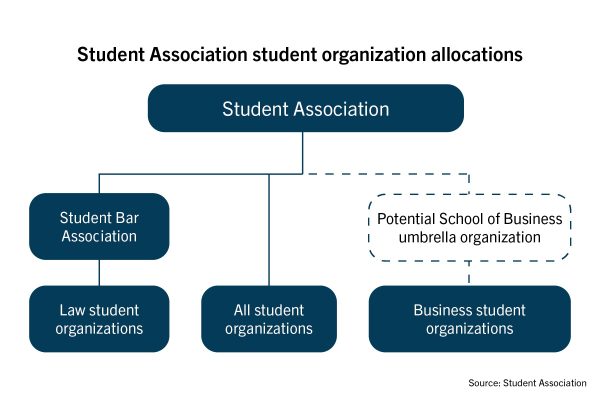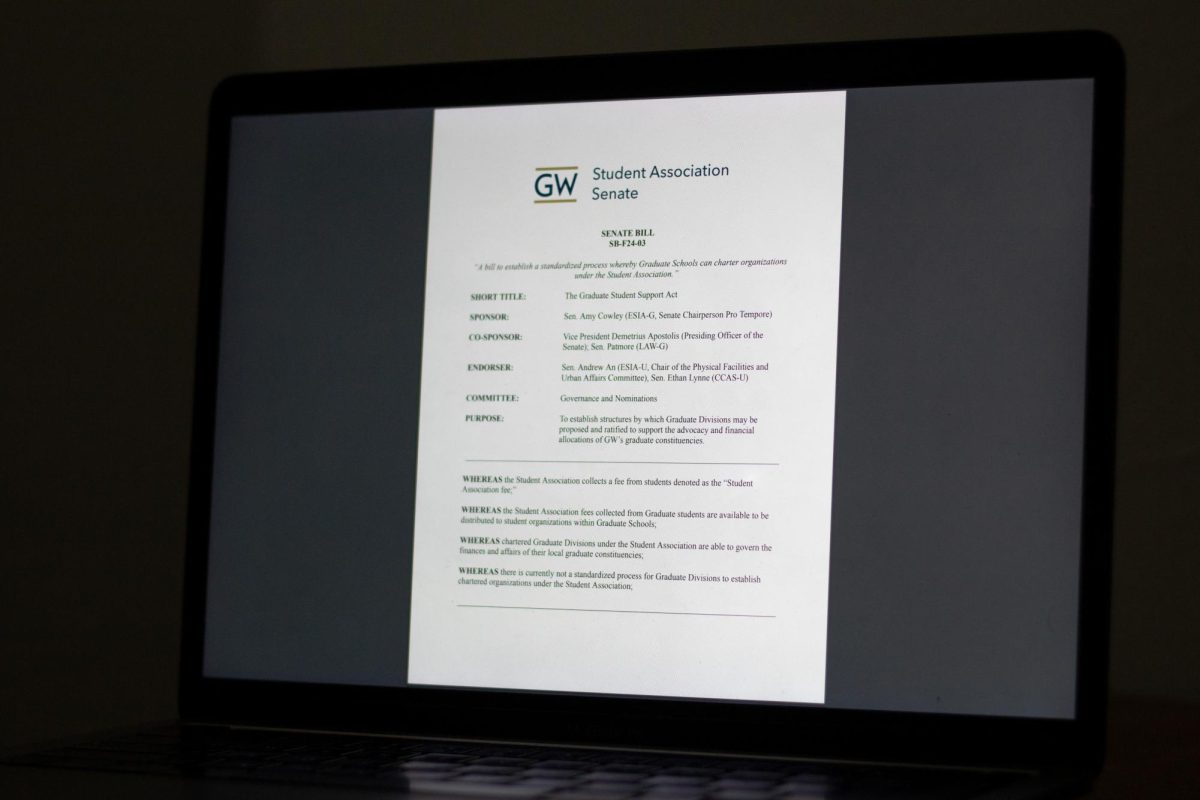Updated: Oct. 23, 2023, at 9:16 p.m.
The Student Association Senate passed a bill earlier this month that will make it easier for graduate students to form governing bodies under the SA.
Student leaders across the SA and the Student Bar Association said the Graduate Student Support Act will bolster graduate student involvement and ensure their student organizations have greater control over fund allocations to their organizations. Graduate and professional students who support the initiative said the bill will allow for greater graduate student representation in leadership and reduce fears that the SA won’t appropriately represent their voices.
Under the current system, the SA allocates funds to all undergraduate and graduate student organizations, except the SBA, which is the only chartered graduate student governing body. For the 2023-24 academic year, the SA gave the SBA $194,997 for the SBA to allocate to law student organizations in a separate allocations process.
The bill’s sponsor, SA Senate Chairperson Pro Tempore Amy Cowley, said she created the bill because she heard the School of Business’ MBA Association — an organization that represents Master of Business Administration students — is hoping to represent all GWSB graduate students. She said the MBAA tried to expand its representation last year, but the MBAA organization’s formation stalled the process because it lacked the authority to change its structure.
Cowley said the new legislation creates a road map for the MBAA to expand to begin governing the entire business school.
“They were kind of the drivers of us realizing this is a major blind spot that we don’t know because all these umbrella orgs were set up in a way that doesn’t give them the ability to change themselves,” Cowley said.
Cowley said 5 percent of the 1,473 GWSB graduate students — or 74 people — must sign a petition by January or February requesting the change to a school-wide governing body. Once they reach the signature threshold, GWSB graduate students will vote on a referendum on the SA 2024 election ballot on whether to finalize the change.
Cowley said the GWSB graduate governing body will create its charter under the SA after the SA Senate and the dean of GWSB approve the measure. She said the GWSB is the only graduate school that has already taken steps toward creating a governing body, but she has also reached out to the governing body of the Elliott School of International Affairs’ graduate students to make them aware of the new bill.
“Right now, it’s only the School of Business that’s been actively pursuing it,” Cowley said. “But I think once we get the word out, that could change.”

SBA President Shallum Atkinson said he would like to see more graduate schools have graduate governing bodies under the SA like the SBA. He said the SBA can better direct SA funds to law student organizations than the SA Senate because those senators are removed from the law student experience.
“It’s a very unique situation when you feel like the undergraduate student organization or students are dictating what graduate students are doing,” Atkinson said. “We have very different experiences and are in a different place in our life.”
One of the bill’s co-sponsors, SA Sen. Simon Patmore-Zarcone (Law-G), said the SBA fosters “program-specific engagement” throughout the law school and that additional graduate governing bodies would drive similar engagement among other graduate students, who make up more than half of the total student population at GW.
“If those organizations had to apply to the SA Finance Committee for general allocation and co-sponsorship, I’m not sure that they would receive as robust funding and consequently, I don’t think that the engagement with students would be good,” Patmore-Zarcone said.
The bill will require SA senators who represent graduate schools in the SA to also be representatives within their new graduate governing body. SA Vice President Demetrius Apostolis said this will foster connection between the SA and new governing bodies.
“What that will do is allow the graduate umbrella orgs to connect directly with the Student Association, hearing real-time feedback so that we can really address some more of those concerns that we don’t always hear about since we’re not graduate students,” Apostolis said.
Munya Kaudani, a first-year master’s student studying electrical engineering, said the bill could help engineering-based student organizations, especially ones that build machines, in advocating for resources that the SA Senate may be less familiar with.
“If there was a body that was more engineering-focused, it would benefit all the organizations that are under engineering as opposed to having one general body,” Kaudani said. “The prioritization of things, maybe they may not see things from an engineering point of view and they might not understand what is required to be able to set up an engineering project from start to finish.”
Lucas Chandler, a third-year doctoral student studying theoretical nuclear physics, said in a message that allowing groups of people to self-govern is beneficial in general, adding that he could see how the bill might be useful in getting more graduate students to feel more connected.
John Van Fossen, a first-year master’s student studying environmental resource policy, said increased representation in any form is a good thing, whether it’s for undergraduates or graduates.
“It’s a step in the right direction if they’re trying to include as many voices as they can, graduate versus undergraduate,” Van Fossen said.
This post was updated to correct the following:
The Hatchet incorrectly reported that Patmore-Zarcone serves on the SA and the SBA. Patmore-Zarcone is only a senator on the SA. We regret this error.





